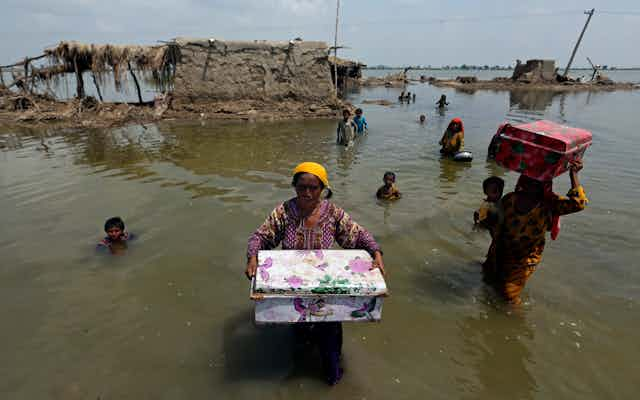Join us on this episode of Don’t Call Me Resilient as we speak with researcher and migration expert Yvonne Su about climate-induced migration, the ways in which the climate crisis should factor into refugee claims and the burden of care that is owed to displaced people.
Recently, there have been some troubling images coming out of Pakistan, where devastating floods have taken the lives of more than 1,500 people and displaced close to 8 million. The floods have also submerged farmlands and spread waterborne illnesses. In total, it is estimated that the floods have so far impacted over 33 million people.
So the picture is bleak.
And a lot of this suffering can be linked to human-induced climate change.
In other words, the global climate crisis has been driven by the burning of fossil fuels and deforestation by western states. Meanwhile, some populations continue to bear the brunt of the impact. Given this, do the United Nations and those states who have contributed most to the problem have the moral responsibility to protect and compensate those most harmed by climate change?
This month, leaders from over 190 countries gather in Egypt for COP27, the United Nations Climate Change Conference. Previous UN climate change summits have been criticized by Indigenous and environmental activists who say the so-called solutions coming out of them have done more harm than good.
Will this year be different? Will leaders be paying attention to real solutions for people in Pakistan that are being displaced right now?
Join us as we speak with Yvonne Su, Assistant Professor in the Department of Equity Studies at York University. Yvonne specializes in migration, including climate change-induced displacement both globally and in Canada. She has a PhD in Political Science and International Development from the University of Guelph and a Masters in Refugee and Forced Migration Studies from the University of Oxford.

Listen and Follow
You can listen to or follow Don’t Call Me Resilient on Apple Podcasts, Google Podcasts, Spotify or wherever you listen to your favourite podcasts. We’d love to hear from you, including any ideas for future episodes. Join The Conversation on Twitter, Facebook, Instagram and TikTok and use #DontCallMeResilient.
Also in The Conversation
Read more: Pakistan floods: will rich nations ever pay for climate loss and damage?
Read more: Loss and damage: Who is responsible when climate change harms the world's poorest countries?
Read more: COP27: Which countries will push to end fossil fuel production? And which won't?
Read more: Wildfire and flood disasters are causing 'climate migration' within Canada
Read more: UN ruling could be a game-changer for climate refugees and climate action
Read more: A Canadian senator aims to end the widespread financial backing of fossil fuels
Sources
The unbearable heaviness of climate coloniality by Farhana Sultana
Should we bring back climate refugees? By Yvonne Su
Climate change communication and Indigenous publics by Candis Callison
Transcript
For an unedited transcript of this episode, go here.
Don’t Call Me Resilient was produced in partnership with the Journalism Innovation Lab at UBC and with a grant from the Social Sciences and Humanities Research Council of Canada.

